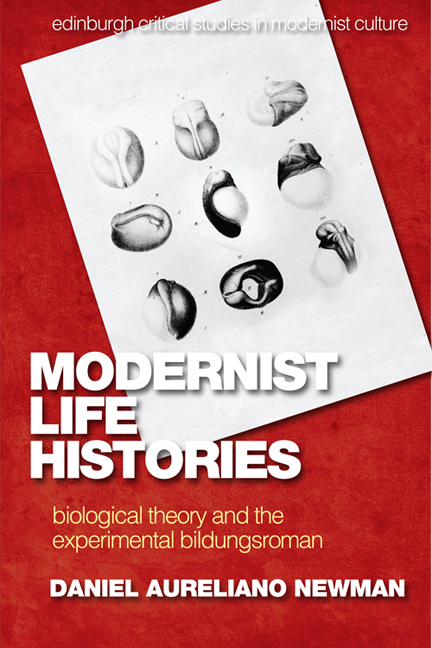Book contents
- Frontmatter
- Contents
- List of Figures
- Preface
- Acknowledgements
- Series Editors’ Preface
- List of Abbreviations
- Introduction
- 1 Bildung, Biology and the Narrative Structure of Development
- 2 A Portrait of the Artist as a ‘Biologist in Words’: Language, Epiphany and Atavistic Bildung
- 3 Mendelian Inheritance, ‘Eternal Differences’ and Entropy in Howards End
- 4 ‘Tampering with the Expected Sequence’: Heterochrony and Sex Change in Orlando
- 5 Anachrony, Neoteny and the ‘Education of an Amphibian’ in Eyeless in Gaza
- 6 Beginning Again: Darwin’s Caterpillar from George Eliot to Beckett
- Conclusion
- Bibliography
- Index
6 - Beginning Again: Darwin’s Caterpillar from George Eliot to Beckett
Published online by Cambridge University Press: 23 April 2021
- Frontmatter
- Contents
- List of Figures
- Preface
- Acknowledgements
- Series Editors’ Preface
- List of Abbreviations
- Introduction
- 1 Bildung, Biology and the Narrative Structure of Development
- 2 A Portrait of the Artist as a ‘Biologist in Words’: Language, Epiphany and Atavistic Bildung
- 3 Mendelian Inheritance, ‘Eternal Differences’ and Entropy in Howards End
- 4 ‘Tampering with the Expected Sequence’: Heterochrony and Sex Change in Orlando
- 5 Anachrony, Neoteny and the ‘Education of an Amphibian’ in Eyeless in Gaza
- 6 Beginning Again: Darwin’s Caterpillar from George Eliot to Beckett
- Conclusion
- Bibliography
- Index
Summary
Man, in the course of his individual evolution, passes through a series of transformations no less astonishing and remarkable than the well-known metamorphoses of the butterfly.
– Ernst Haeckel, The Evolution of Man (1883: 3)Freighted with mythic and religious resonances, butterfly metamorphosis is probably the most important biological counterpart of the Bildungsroman. The two developmental narratives chart the individual's progress from earthbound body (the caterpillar-child with its corporeal appetites) through introspective mind (the chrysalis-adolescent) to beautiful spirit (the imago-adult). In the myth of Psyche, whose name means soul and butterfly, metamorphosis is a transformation from mortal to goddess. This allegory adapted easily to Christianity, representing the release of the immortal soul from the mortal body, or else the awakening of being born again. It was a favoured image of Symbolist and fin-de-siècle poets. Thomas Mann made it a ‘central issue’ in his recuperation of Bildung (Vuillet 2012: 99). The trope persists in the secular ideal of maturity as self-realisation and autonomy in pedagogy, psychoanalysis and human rights.
The spiritual dimension of the butterfly allegory is a frequent target of modernist irony. Joyce, as we have seen, undercuts Stephen's vision of ‘spiritual progress’ (PA 148) as a metamorphic renewal, ‘as if his very body were divested with ease of some outer skin or peel’ (PA 149). Musil mocks his protagonist Törless's similarly sanguine outlook on his own education as a mere ‘game; something to help through this larval stage [Larvenexistenz] of school life. It had no connection with his true nature, which would only emerge later, at some as yet remote and undecided time in the future’ (2013: 47). The spiritual allegory is travestied in the reversionary transformations of Orlando and Gregor Samsa. Deflations of the butterfly allegory culminate in Henry Green's Blindness, whose division into three parts entitled ‘Caterpillar’, ‘Chrysalis’ and ‘Butterfly’ suggests the successful Bildung of would-be writer John Haye. Undermining the promise of the three subtitles, however, is the persistent ironic deflation of John's aspirations. Determined to write a novel, John makes a final announcement – ‘I am going to settle down to writing now’ (Green 2008: 505) – as ambiguous as that of Stephen Dedalus. Seemingly triumphant in the end, John is in fact stating an intention he has already repeatedly expressed without writing anything.
- Type
- Chapter
- Information
- Modernist Life HistoriesBiological Theory and The Experimental Bildungsroman, pp. 163 - 187Publisher: Edinburgh University PressPrint publication year: 2018



